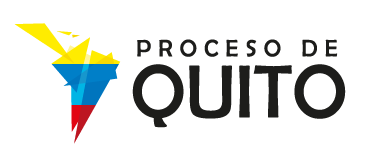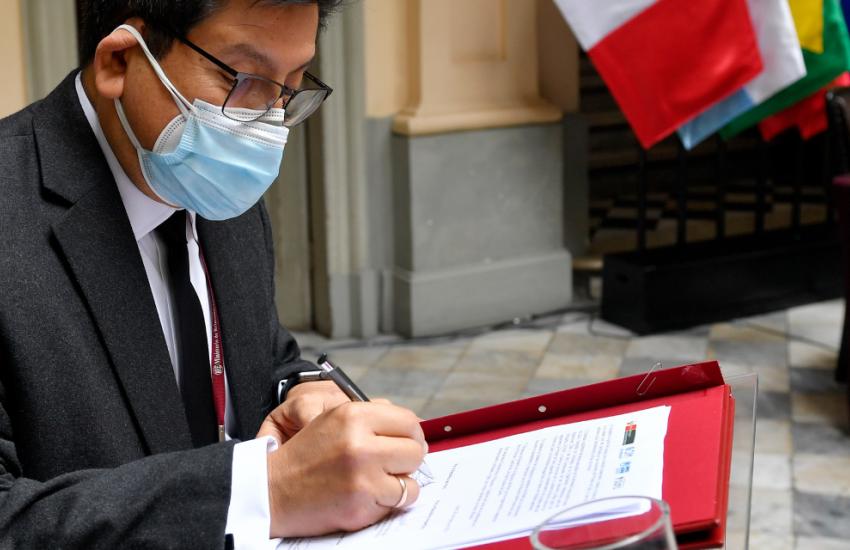SEVENTH JOINT DECLARATION OF THE QUITO PROCESS - LIMA CHAPTER IS APPROVED
Lima, May 28th, 2021 – In a ceremony held at the Torre Tagle Palace of the Peruvian Foreign Ministry in Lima, the ambassadors of the Member States signed and ratified the 7th Joint Declaration of the Quito Process on May 28. During the ceremony, Brazil announced the decision to assume the next Pro Tempore Presidency.
The member states signed the text of the Joint Declaration at the close of the Plenary session of the Lima Chapter, and reaffirmed their commitment to continue supporting solutions for the 4.6 million refugees and migrants from Venezuela in Latin America and the The Caribbean, whose vulnerabilities have been exacerbated in the midst of the COVID-19 pandemic.
The document collects the work of the leading States in all thematic axes. The advances focus on refugee and asylum issues; orientation centers, temporary reception, and support spaces; education; gender equality; protection of girls, boys, and adolescents; socio-economic insertion; family reunification; human trafficking; COVID-19 and HIV / AIDS.
The event’s speakers, regional directors of United Nations agencies and international organizations, coordinating agencies, delegates of the Group of Friends and financial institutions, all expressed their support to the commitment of the States to jointly advance in technical matters in each thematic axis, and they praised the comprehensive document in response to the situation of human mobility in the region.
Ambassador Vitaliano Gallardo, Director General of Peruvian Communities Abroad and Consular Affairs, in charge of the Pro Tempore Presidency of Peru, highlighted the progress of the Joint Declaration and the commitment of the countries of the region. In turn, he saluted Brazil for its decision to assume the reins of the Process. Rodrigo Baena Soares, Brazilian Ambassador to Peru, was in charge of formally accepting the nomination.
"The Quito Process is testimony to the will to continue strengthening our beloved region, embracing diversity with empathy and with the generosity that has always characterized it" said Eduardo Stein, Joint Special Representative of UNHCR and IOM for refugees and migrants from Venezuela, who added that "fostering positive inclusion in planning strategies is key to the necessary and urgent cohesion of Latin America and the Caribbean."
With the leadership of Peru from the Pro Tempore Presidency, the Quito Process advanced in this period in the integration of the United Kingdom, Italy, and the Inter-American Development Bank (IDB) as new members of the Group of Friends (also made up of Spain, the Netherlands, Switzerland, Germany, France, the European Union, Canada and the United States) and in the organization of high-level meetings at the regional level, including the II Regional Meeting of Ministers of Labor, aiming to discuss a roadmap regarding socioeconomic integration.
By accepting the next Pro Tempore Presidency, Brazil made reference to its commitment to continue promoting all the issues that have been discussed in the working groups with a regional approach oriented towards international cooperation.
UNHCR, the UN Refugee Agency, and IOM, the International Organization for Migration, in turn, applauded the commitments reached in the Joint Declaration in favor of refugees and migrants in the region. Both organizations praised the commitment of the Government of Brazil to assume the new Pro Tempore Presidency of the Process, which will begin on June 22.
The signatory governments pledged to advance in the implementation of the Regional Strategy for Socioeconomic Integration; advance the implementation of the Regional Monitoring Framework for students in a situation of mobility; strengthen actions to guarantee the protection of children; take note of the guiding principles and standards in the Guidance Centers, temporary reception, and Support Spaces to strengthen care systems; continue to strengthen national capacities for asylum and refuge and to establish a complementary approach between the international protection statutes; adopt the standardization of antiretroviral therapy on the subject of HIV / AIDS; support the realization of a regional diagnosis on family reunification mechanisms; advance in joint efforts to implement the Regional Coordination Mechanism for the Prevention, Protection and Assistance and Judicialization of the crime of Human Trafficking; reaffirm the commitment to the protection and comprehensive assistance for girls, adolescents, and women, and coordinate actions to meet the needs of Venezuelan refugees and migrants in the context of the COVID-19 pandemic.


